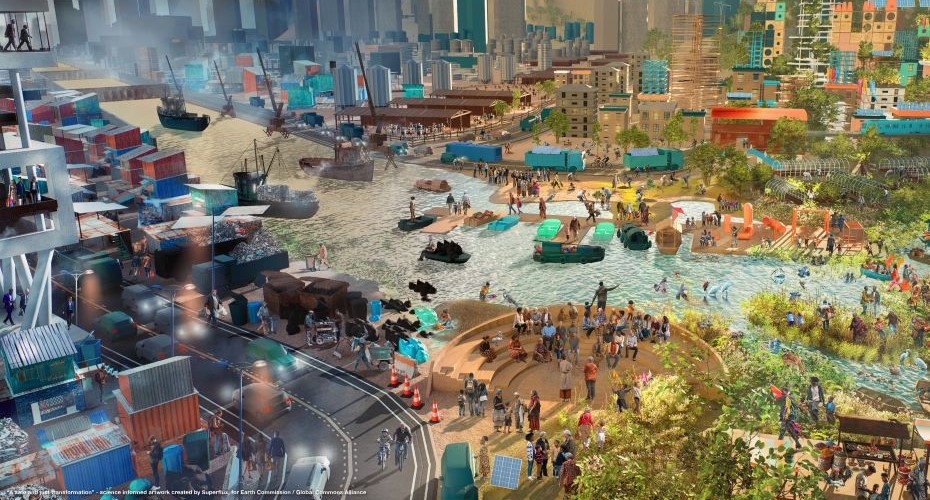New research reveals path to prosperity for planet and people if Earth’s critical resources are better shared

A 'safe and just space' transformation. Science informed artwork created by Superflux for Earth Commission/Global Commons Alliance
Research published in The Lancet Planetary Health shows that the planet will only remain able to provide a basic standard of living for everyone in the future if economic systems and technologies are dramatically transformed and critical resources more fairly used, managed and shared.
The report, co-authored by over 60 leading natural and social scientists from the Earth Commission, including academic experts from the University of Exeter, builds on research into ‘Safe and Just Earth System Boundaries’ published last year in Nature, which found that most of the vital limits within which people and the planet can thrive have been surpassed.
The new report identifies the “Safe and Just Space” – within which harm to humans and nature can be minimised while everyone can be provided for – and sets out the paths to reach and stay within this space.
It finds that although it remains possible for all humans to escape poverty and be safe from the harm caused by Earth system change, the planet’s ability to provide and protect is being stretched past its limits.
The scientists warn that future projections to 2050 show that the Safe and Just Space will shrink over time, driven by inequality, unless urgent transformations take place.
For climate specifically they found that if significant changes aren’t made now, by 2050 there will be no Safe and Just Space left.
This means that even if everyone on the planet only had access to the resources necessary for a basic standard of living in 2050, the Earth will still be outside the climate boundary.
Inequalities and overconsumption of finite resources by a minority were found to be key drivers of this shrinking.
The report states that providing minimum resources for those who don’t currently have enough would add much less pressure on the Earth system than that currently caused by the minority who use far greater resources.
It warns that Earth systems face the risk of crossing dangerous tipping points which would cause further significant harm to people around the world – unless energy, food and urban systems are urgently transformed.
The scientists say the only way to provide for everyone and ensure societies, businesses and economies thrive without destabilising the planet is to reduce inequalities in how critical Earth system resources, such as freshwater and nutrients, are accessed and used – alongside economic and technological transformation.
Cities and businesses can play a crucial role in this and become the stewards of our critical Earth systems, and the report provides a guide to how they can reduce their impact on the planet.
The Earth System Boundaries published last year can be seen as the “ceiling” for human extraction of natural resources and pollution, within which the Earth systems can remain stable and resilient, and people can be safe from harm.
Now, scientists have added a “foundation” by showing us what the global population needs from the Earth system to live a life free from poverty.
This is the first time scientists have quantified safety (a stable planet) and justice (people being protected from harm) in the same units – demonstrating that justice is a prerequisite for the safety of the planet and people. The paper builds on fundamental ideas of Earth System Justice, published in Nature Sustainability and Environmental Politics.
The research also looks at where on the planet the Safe and Just boundaries have been breached, and overlayed this with people living in poverty who are exposed to harm from climate change, biodiversity loss, pollution and water shortages.
The findings show that already vulnerable communities are often the most affected by Earth system change that impacts the health of people and ecosystems – but everyone, including the wealthy, is at risk.
Joyeeta Gupta, former co-chair of the Earth Commission, and Professor of Environment and Development in the Global South at the University of Amsterdam, said: “We’re beginning to realise the damage that inequality is doing to the Earth. Increasing pollution and poor management of natural resources is causing significant harm to people and nature. The longer we continue to widen the gap between those who have too much and those who don’t have enough, the more extreme the consequences for all, as the support systems which underpin our way of life, our markets and our economies begin to collapse.”
Johan Rockström, co-chair of the Earth Commission, Director of the Potsdam Institute for Climate Impact Research and Professor in Earth System Science at the University of Potsdam, said: “For the first time, scientists have quantified safety and justice using the same units in order to determine the path forward to a stable and resilient future in which we can all thrive. This paper shows that justice is a prerequisite for the safety of the planet and people. It looks at the risk for further decline of the Earth system, the harm communities are experiencing as a result, but also seeks to identify how resources need to be fairly distributed. Communities, poor and rich, across the world are already vulnerable and will become more exposed – but we have a window to act now and change course.”
University of Exeter co-authors of the report include Professor Tim Lenton, Dr Jesse Abrams and Dr David Armstrong McKay from the Global Systems Institute, and Professor Gail Whiteman from the University of Exeter Business School.
Dr Jesse Abrams said: “Our research demonstrates that justice isn’t just a moral imperative – it’s essential for the planet’s stability. We must urgently address inequality – we’ve found that providing basic resources for those in need would put far less pressure on Earth’s systems than the overconsumption by a minority. This will require formative changes to our economies and technologies to better share and manage the resources and the life support system that we all depend on. The Safe and Just Space is shrinking. However, our findings also offer hope – with concerted action from governments, businesses, and communities, we can create a world that provides for everyone.”
The Safe and Just Space is the only remaining space rich in opportunities – in which people and the planet will remain able to thrive. To reach this space, the paper calls for change in three areas:
- Firstly, a well-coordinated, intentional effort between policymakers, businesses, civil society and communities can push for changes to how we run the economy and find new policies and funding mechanisms that can address inequality whilst reducing pressure on nature and climate.
- Secondly, fundamental to the transformation is more efficient and effective management, sharing and usage of resources at every level of society – including addressing the excess consumption of some communities which is limiting access to basic resources for those who need them the most.
- Thirdly, investment in sustainable and affordable technologies is essential to help us use fewer resources and to reopen the Safe and Just Space for all – particularly where there is little or no space left.
Businesses and cities in particular have a leading role to play in reducing the pressure on the planet. By operationalising the Earth system boundaries and using them as a basis for science based targets, they can become better stewards of Earth’s natural resources.
Xuemei Bai, member of the Earth Commission, Distinguished Professor at Fenner School of Environment and Society, Australian National University, said: “Companies and cities have a huge potential to make a difference, especially if they work towards the same goal – ensuring the planet can provide for everyone long-term. They are more nimble and flexible than states, and can reduce their pressure on the planet by setting science-based targets in line with our findings.”



